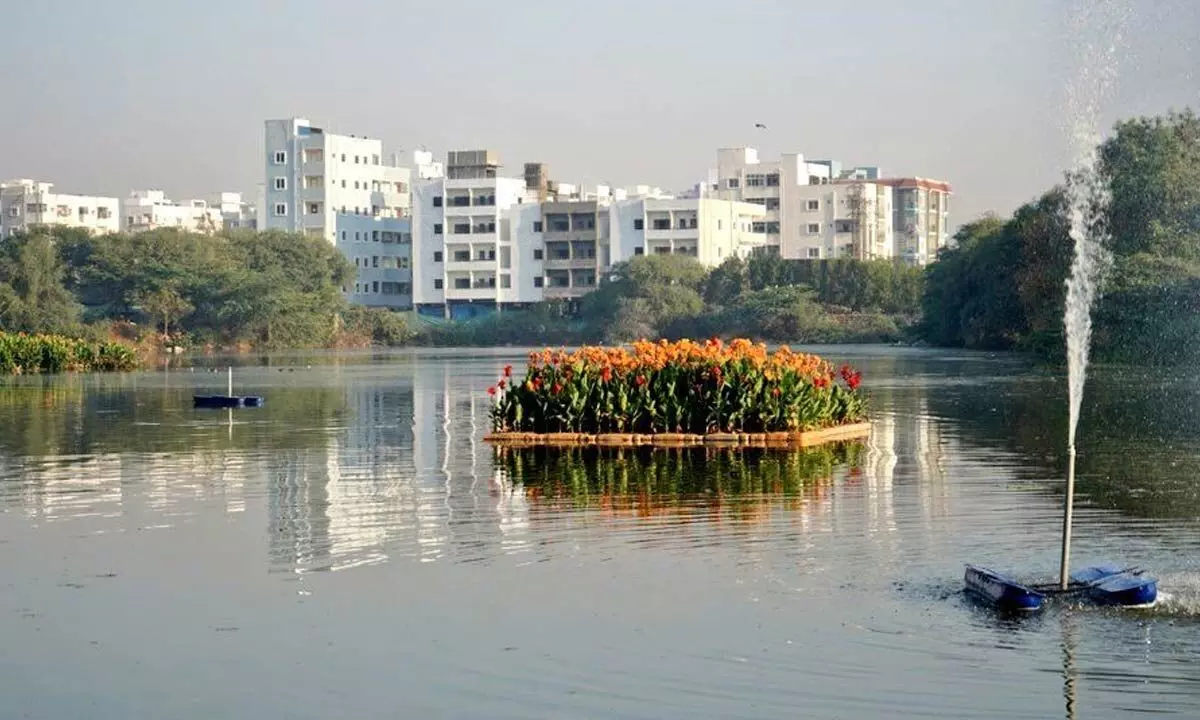Live
- WPL 2025: Matthews, Sciver-Brunt and Harmanpreet carry MI to massive 213/4
- MLA Anirudh Reddy Accuses KTR of Involvement in Manhattan Project Scam
- TGPSC Clarifies on False Propaganda Regarding Group-1 Recruitment
- Hyderabad Police Ensures Security as Holi and Ramadan's Second Friday Coincide
- Five MLCs Elected Unopposed in Telangana Under MLA Quota
- Sambhal prepares for a peaceful Holi with tightened security and special patrols
- CNG, PNG prices to become cheaper in Rajasthan from March 14
- Anti-Rape ad to screen in theaters before movies, like health advisories
- Prodigy Finance Offers Three Scholarship Awards totalling an amount of $19,000 for Global Students Starting Fall 2025
- Champions League drama likely to affect La Liga with big games this weekend
Hyderabad: Neknampur Lake wins accolades from Niti Aayog for restoration


Neknampur Lake with an area of 25 acres was contaminated with garbage, sewage, water hyacinth, cultural siltation and debris dumping. Encroachment issues plus legacy garbage dumped place of Manikonda Municipality in Hyderabad became a serious cause of concern
Hyderabad: Neknampur Lake within the city stands as an exemplary model for the entire country. NITI Aayog, in its latest publication titled “Compendium of Best Practices in Water Management 3.0,” has bestowed recognition upon the lake as a pinnacle of restoration among India’s various water bodies.
As per NITI Aayog report 90 percent reduction in the Biochemical oxygen demand (BOD) of the lake due to constant maintenance of various treatment system used in rejuvenating the water body. Neknampur lake water analysis parameters have been improving day by day, as per TSPCB data (April 2023) Ph level -7. 1, Conductivity is 1449, BOD- 8 and Nitrate 4.4. Although a few parts of 25 acres of Lake has strains of sewage still no smell or odor does not emanate from the lake and the main reason behind this is that various treatment system used in rejuvenating the lake that includes Phytoremediation & bioremediation to purify water in the lake, Desilting of the lake, Floating treatment wetlands installation & their maintenance at the lake.
This is not the first time that Neknampur Lake has been selected, even in the year 2022 in the NitiAayog Urban wastewater Scenario in India report the lake was recognized for how wastewater has been restored in lake.
According to a report by NITI Aayog, there has been a remarkable 90 percent reduction in the Biochemical Oxygen Demand (BOD) of Neknampur Lake. This notable improvement is attributed to the diligent maintenance of various treatment systems employed to rejuvenate the water body. The ongoing efforts have led to a consistent enhancement of the lake’s water quality parameters, as evidenced by TSPCB data from April 2023, which indicates a pH level of 7.1, conductivity measuring 1449, BOD at 8, and nitrate content at 4.4.
Despite the presence of sewage strains in certain portions of the 25-acre lake, there is a distinct absence of unpleasant odors or smells emanating from the water body. This achievement can be attributed to the comprehensive treatment approach implemented for lake rejuvenation. Notably, methods such as phytoremediation and bioremediation have been harnessed to purify the lake’s water. Other significant measures include thorough desilting, the installation of floating treatment wetlands, and their ongoing maintenance.
It’s worth noting that this recognition is not the first of its kind for Neknampur Lake. In the NITI Aayog Urban Wastewater Scenario in India report for the year 2022, the lake garnered recognition for its effective restoration of wastewater. This consistent acknowledgment underscores the impactful and innovative strategies employed in the restoration efforts of Neknampur lake.
What is now considered one of the cleanest lakes in the city was once marred by sewage and litter. Neknampur Lake, a striking transformation, is currently a thriving habitat for more than 2000 turtles, an array of dragonflies, and numerous other species.
Reflecting on the lake’s past condition, Madhulika Chowdhary, the visionary behind Dhruvansh (an NGO pivotal in safeguarding and elevating the lake), recollected, “In 2016, we resurrected the 25-acre lake through concerted efforts, collaborating closely with local authorities and the government. The initial step involved the comprehensive removal of accumulated waste. Additionally, the lake was repurposed as an idol immersion site, effectively discouraging waste disposal. Employing an innovative soilless hydroponics technique, Neknampur lake pioneered the use of floating plants, a first in the country. To enhance its allure, the lake now boasts an amphitheater, floating bicycles, and aerators, all harmoniously adrift on its surface.”
Bioremediation and phytoremediation, both successful models, were instrumental in the lake’s restoration. These methods, proven effective in reducing up to 80 percent of the Biochemical Oxygen Demand (BOD), stand as economical solutions. Madhulika emphasized the crucial role of cultural rejuvenation in the holistic process of lake restoration.
Shilpi Sharma, Regional Coordinator of the Telangana State Biodiversity Board, expressed her awe at the remarkable conservation and innovation displayed by Neknampur Lake.
She remarked, “In Telangana State, I have yet to encounter a lake that has been conserved with such diligence and innovation. The lake’s surrounding ecological diversity is impeccably maintained.
The stark contrast from 2016, when the pervasive foul odor deterred visitors, is now a delightful scene with numerous visitors savoring the rejuvenated ambiance.”
Intervention:
8 Phytoremediation & bioremediation to purify water in lake
8 Desilting of lake
8 Floating treatment wetlands
installation & their maintenance at lake
8 Ecological beds establishment at lake
8 Solar Floating Aerators at lake to make the lake energy free
8 Floating Bikes at lake to remove floating
8 Stopping of Invasive species in lake water like catfish & red-eared terrapin
Outcome
8 90% reduction in BOD of the lake due to constant maintenance of treatment system
8 Beautiful lake with no smell or odor though sewage is still coming into lake
8 Water hyacinth still in lake but never covered the lake
8 Recreational place for Community
8 Lake rejuvenation & Community rejuvenation going parallel

© 2025 Hyderabad Media House Limited/The Hans India. All rights reserved. Powered by hocalwire.com






